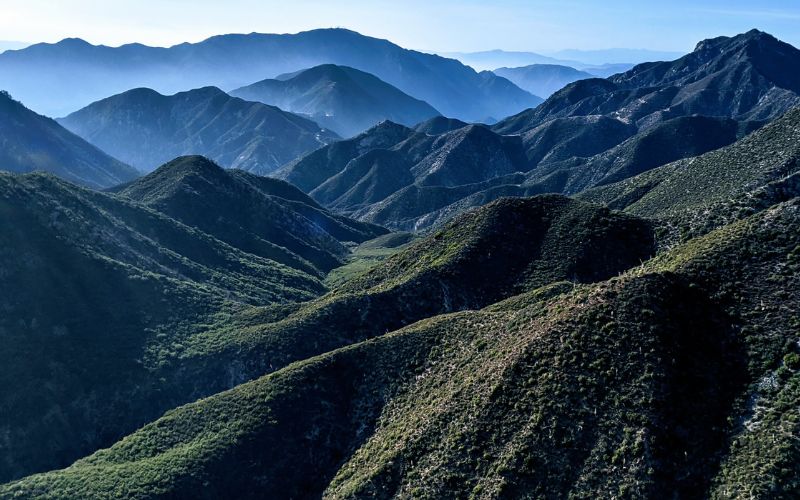
- Details
- By Kaili Berg
President Biden announced today that the San Gabriel Mountains and Berryessa Snow Mountain National Monuments will be expanded by 120,000 acres.
The Berryessa Snow Mountain National Monument, located northwest of Sacramento, encompasses nearly 331,000 acres. President Biden's proclamation aims to increase the size of this monument by 13,696 acres, offering opportunities for various recreational activities.
In Northern California, the Yocha Dehe Wintun Nation's efforts to include Molok Luyuk (Condor Ridge) within the Berryessa Snow Mountain Monument highlight its millennia-old connection to their heritage. The area holds immense importance for religious ceremonies and trade routes.
“We thank President Biden for expanding the Berryessa Snow Mountain National Monument and protecting Molok Luyuk, an area steeped in thousands of years of rich history and profound meaning to the Patwin people, whose traditional territory stretches south from these hills to the shores of San Pablo Bay and east to the Sacramento River,” said Yocha Dehe Tribal Chairman Anthony Roberts in a press release. “Elements of the natural landscape on the ridge have traditional cultural significance to us. We look forward to the day when condors fly over Molok Luyuk once again.”
Reps. John Garamendi (D-Calif.) and Mike Thompson (D-Calif.) have led legislative efforts to enlarge the monument and facilitate tribal co-management. The presidential proclamation will rename the additional ridgeline Molok Luyuk and explore co-stewardship with Tribal Nations.
In Southern California, the Fernandeño Tataviam Band of Mission Indians and the Gabrieleno San Gabriel Band of Mission Indians advocated for the expansion of the San Gabriel Mountains National Monument, emphasizing its rich cultural heritage.
“We are thrilled that the San Gabriel Mountains National Monument is expanding,” Rudy Ortega Jr., President of the Fernandeño Tataviam Band of Mission Indians said in a press release. “We thank the Biden administration for making this longstanding vision a reality. Expanding the monument helps protect lands of cultural importance to my people who are part of this nation's history and who have cared for these lands since time immemorial. It also further protects areas that are critical for our environment and the wildlife and plants that depend on this landscape."
Sen. Alex Padilla (D-Calif.) and Rep. Judy Chu (D-Calif.) have championed legislation to enlarge the San Gabriel Mountains National Monument, but the measure has stalled in the divided Congress. Biden used his executive authority under the 1906 Antiquities Act to bypass the gridlock on Capitol Hill.
President Biden's plan expands the San Gabriel Mountains National Monument, east of Los Angeles, by 105,919 acres, adding to its existing 346,000-acre span in the Angeles National Forest. These mountains provide sanctuary for various species, while Molok Luyuk serves as a vital wildlife corridor and habitat for over 30 rare plant species.
The expansion reflects a commitment to honoring tribal heritage, achieving federal conservation goals, and tackling climate change, according to the White House. It responds to calls from California Tribes and Indigenous leaders to safeguard culturally significant landscapes.
The expansion of these two national monuments will also help address the climate and biodiversity crises by protecting important habitat and wildlife corridors and contributing to state and federal goals to conserve 30% of public lands and waters by 2030.
“I’m thrilled and deeply thankful,” California Natural Resources Secretary Wade Crowfoot said in a press release. “President Biden’s action protects two very special places in California for future generations.”
More Stories Like This
A River Worth Defending: Chilkat Community Mobilizes Against MineU.S. Forest Service Approves Drilling at Pe’ Sla, Threatening Indigenous Land and Water
Gwich'in Tribal Governments Submit Comments Challenging Fish and Wildlife Service's Inadequate Environmental Review of Arctic Refuge Snow Road
Rappahannock Tribe Challenges 9M-Gallon Water Plan
Feds release draft long-term plans for Colorado River management
Help us defend tribal sovereignty.
At Native News Online, our mission is rooted in telling the stories that strengthen sovereignty and uplift Indigenous voices — not just at year’s end, but every single day.
Because of your generosity last year, we were able to keep our reporters on the ground in tribal communities, at national gatherings and in the halls of Congress — covering the issues that matter most to Indian Country: sovereignty, culture, education, health and economic opportunity.
That support sustained us through a tough year in 2025. Now, as we look to the year ahead, we need your help right now to ensure warrior journalism remains strong — reporting that defends tribal sovereignty, amplifies Native truth, and holds power accountable.
 The stakes couldn't be higher. Your support keeps Native voices heard, Native stories told and Native sovereignty defended.
The stakes couldn't be higher. Your support keeps Native voices heard, Native stories told and Native sovereignty defended.
Stand with Warrior Journalism today.
Levi Rickert (Potawatomi), Editor & Publisher


